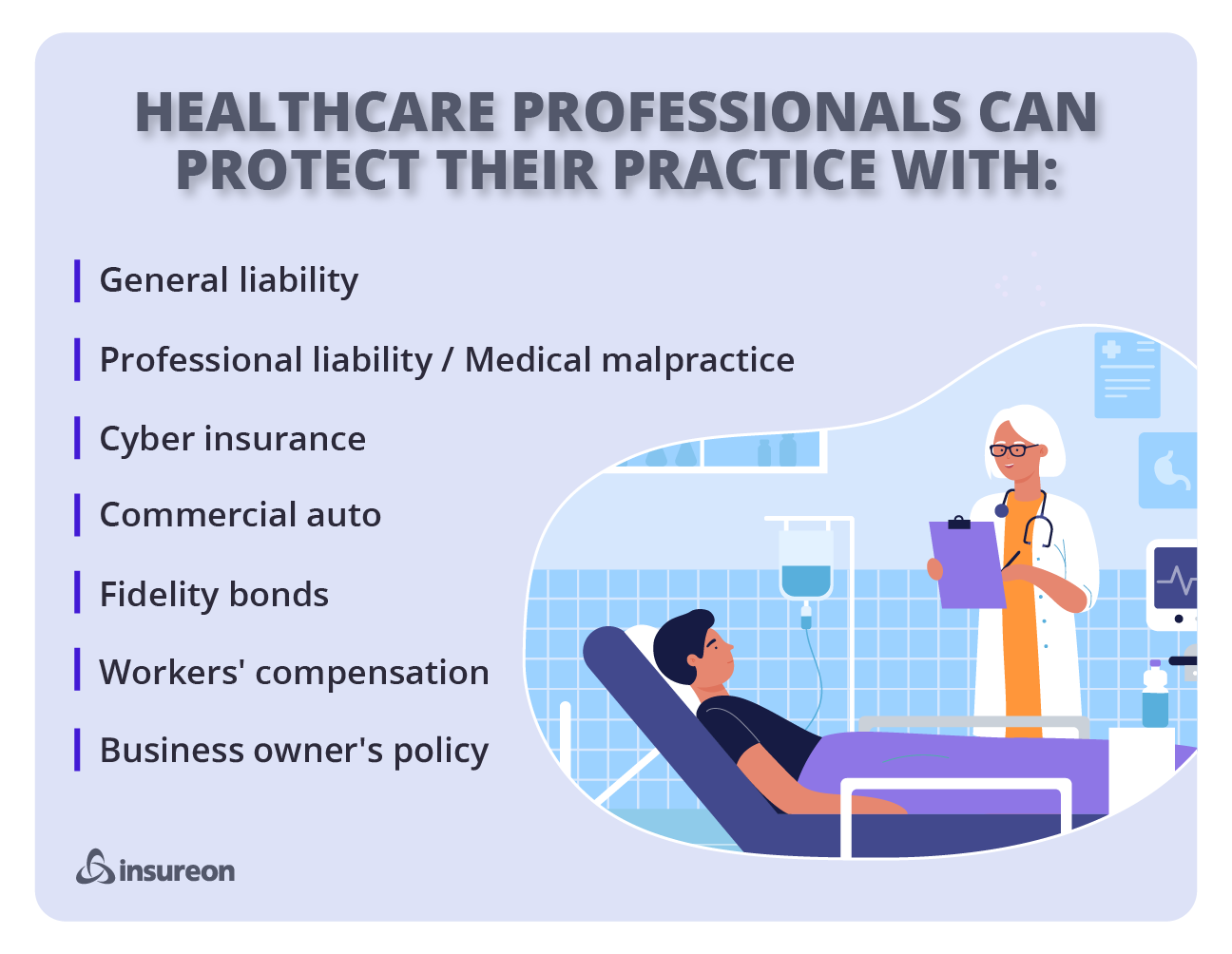
Top healthcare professionals we insure
Recommended business insurance policies for healthcare professionals
From acupuncture to radiology, healthcare professionals rely on business insurance to withstand lawsuits and accidents. Insureon helps you secure the right coverage for your clinic.
General liability insurance
General liability insurance covers basic third-party risks for small business owners, such as a customer who slips and suffers an injury in your office. It's often required for a commercial lease.
- Slip-and-fall injuries
- Patient property damage
- Libel and other advertising injuries
Business owner’s policy
A BOP bundles commercial property insurance and general liability coverage in one plan. It's often the most cost-effective type of business insurance for healthcare specialists.
- Patient injuries from accidents
- Damaged business property
- Business interruption incidents
Workers' compensation insurance
Most states require workers' comp for healthcare businesses that have employees. It also protects sole proprietors from work injury costs that health insurance might deny.
- Employee medical expenses
- Disability benefits
- Lawsuits from employee injuries
Professional liability / medical malpractice
This policy, also called malpractice insurance for medical professionals, can cover legal expenses if a practice is sued for negligence that led to an injury.
- Incorrect diagnoses
- Accusations of negligence
- Mistakes or oversights
Commercial auto insurance
Most states require commercial auto insurance for vehicles owned by a healthcare business. It helps cover the cost of an accident involving your business vehicle.
- Damage caused by your vehicle
- Medical bills from an auto accident
- Vehicle theft and vandalism
Cyber insurance
This policy helps healthcare companies survive data breaches and cyberattacks. It can often be added to a BOP or general liability policy for savings.
- Data breach investigations
- Breach notification expenses
- Fraud monitoring costs
How much does business insurance cost for healthcare professionals?

Insurance costs for healthcare professionals are based on a few factors, including:
- Healthcare services offered
- Type of care, such as inpatient or outpatient
- Medical equipment and other business property
- Annual business revenue
- Where your business is located
- Number of employees on staff

Protect your healthcare business with medical malpractice
[video: an animated header displays the Insureon logo. Underneath it, a subheading displays the text: "What is medical malpractice insurance?"]
MALE VOICEOVER: Even the most experienced healthcare providers can make a mistake. From facing a lawsuit over a misdiagnosis to surgical and medication errors, medical malpractice insurance - sometimes called medical professional liability - insures healthcare professionals, therapists, counselors, and medical facilities against claims of medical negligence.
[video: an illustrated header displays the text: "Malpractice protects against medical negligence, including:"]
[video: Under above header, three bullet points display the text: "Failure to provide quality care"; "A patient's lost wages or healthcare costs"; "Causing pain, suffering, or mental anguish"]
Types of claims covered by medial malpractice insurance include medical errors, like an incorrect dosage of medicine; medical oversights, such as accidentally misreading a patient's medical history; and accusations of negligence, including surgical errors and poor follow-up care.
[video: an illustrated header displays the text: "Medical malpractice insurance covers:"]
[video: Under above header, four bullet points display the text: "Medical errors"; "Medical oversights"; "Accusations of negligence"; "Healthcare providers missing appointments"]
While not required in every state for every profession, if you provide health-related professional services, maintaining malpractice coverage can reduce your financial risk. Doctors and nurses are often serving on the frontline of healthcare and must make critical decisions, which can leave them open to lawsuits. Similarly, physical therapists and acupuncturists often have a high level of interpersonal contact with a patient, which could lead to accusations of malpractice.
The cost of malpractice coverage will likely vary from professional to professional, based on several factors.
[video: an illustrated header displays the text: "Cost is based on:"]
[video: Under above header, four bullet points display the text: "Your state of operation"; "Policy limits and deductible"; "Your liability claims history"; "Any malpractice lawsuits you've faced"]
Get free malpractice insurance quotes with Insureon today.
[video: an illustrated white header displays the text: "Insureon is your #1 agency for small business insurance"]
Click the link to get started.
[video: an animated header displays the Insureon logo]
How do I get healthcare professional business insurance?
It’s easy to find insurance for professionals in the healthcare industry. Whether you’re a dentist, home health provider, or physician's assistant, you’ll need to have some basic information about your business available.
Our application will ask you for your annual revenue and payroll, among other details. You can buy a policy online and get a certificate of insurance with Insureon in three easy steps:
- Complete a free online application.
- Compare free quotes and choose a policy.
- Pay for your policy and download a certificate for proof of insurance.
Insureon's licensed insurance agents work with top-rated U.S. providers to find the right insurance options to manage your business's unique risks, whether you’re a radiologist at a local care facility or work in a busy medical staffing agency.
Verified business insurance reviews
Hear from customers like you who purchased small business insurance.
FAQs about healthcare professional business insurance
Are all healthcare professionals required to carry malpractice insurance?
While not every state requires healthcare professionals to carry medical malpractice insurance, it's often required by government contracts, healthcare networks, and hospitals or other healthcare facilities.
Even when you're not required to have it, malpractice coverage is a key part of risk management. Your patients depend on your specialized skills, and you need to meet a certain standard of care. Not taking the same amount of care that others with your specialized knowledge and training would is called professional negligence, or malpractice.
Medical malpractice claims against physicians and other medical professionals are some of the most well-known professional negligence cases.
What other insurance coverage should healthcare professionals carry?
The main insurance policies that most healthcare professionals carry, such as general liability and medical malpractice, protect their practices from common risks. However, there are additional coverage options to consider as part of your risk management plan.
- Telehealth coverage can be added to your medical professional liability insurance, to extend your coverage to misdiagnoses or patient complaints over telemedicine or virtual counseling services.
- License defense coverage will pay for legal fees and other costs associated with defending nurses during an investigation that may result in action against their nursing licenses. This coverage can usually be added to your professional liability policy.
- Needlestick insurance, or accidental occupational insurance, protects you from needlestick and sharps injuries, as well as blood and bodily fluid exposure.
- HIPAA defense coverage can be included in a professional liability policy to provide coverage for HIPAA violations including proceedings, fines, and penalties.

Want free expert advice right in your inbox?
By entering your email address and subscribing, you agree to our Terms of Use and Privacy Policy
Read our blog posts

Thank you for being the economic backbone of our communities. Behind every small business is a story of independence and resilience, from late nights and big ideas to the courage to bet on...


























